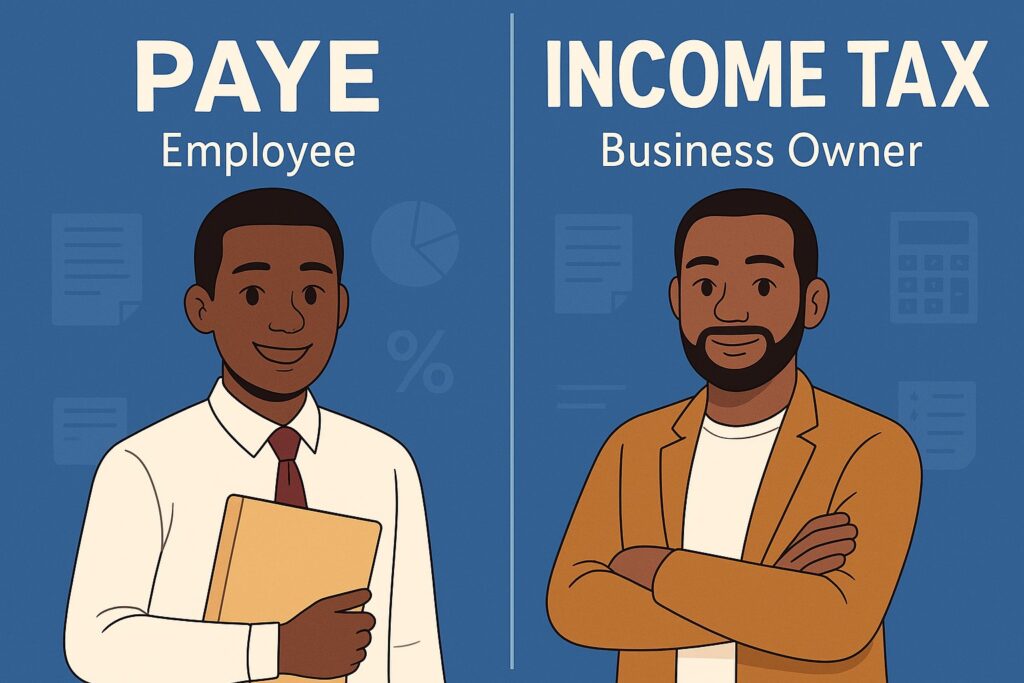Wondering how PAYE differs from Income Tax in Kenya? This 2025 guide breaks down the differences, who pays what, and how employees and business owners are taxed under the law.
💡 Quick Answer:
- PAYE = a method used to collect Income Tax from employees
- Income Tax = a broader tax on any income, whether from salary, business, rent, or investments
Let’s break it down.
🧾 What Is PAYE?
PAYE (Pay As You Earn) is a monthly tax deduction made by employers from an employee’s salary and remitted directly to the Kenya Revenue Authority (KRA).
- Governed by the Income Tax Act – Section 37
- Applies to all employment income above the tax-free threshold
- Includes salaries, wages, bonuses, commissions, allowances
Employers act as withholding agents and must remit PAYE by the 9th of every month
📘 What Is Income Tax?
Income Tax is a broad tax charged on any income earned by individuals or entities in Kenya — not just salaries.
It includes:
- Business income
- Rental income
- Capital gains
- Farming income
- Investment income (e.g. dividends, interest)
- Salaries (via PAYE)
Income Tax is declared through:
- Monthly filings (for some categories)
- Annual self-assessment returns via iTax by 30th June each year
⚖️ Key Differences Between PAYE and Income Tax
| Feature | PAYE | Income Tax |
|---|---|---|
| Who Pays? | Employees | Anyone earning income (individuals or businesses) |
| Collected By | Employer (via deduction) | Self (sole trader, SME, landlord, etc.) |
| Payment Frequency | Monthly (by 9th) | Monthly (for some), plus annual return by 30 June |
| Tax Form | Employer: P9 / P10, Employee: auto-filed | Individual files via iTax (IT1, IT2, etc.) |
| Applicable Law | Income Tax Act – Sec. 37 | Income Tax Act – multiple sections |
| Common Rates (2025) | Graduated up to 35% | Graduated (individuals) or 30% (companies) |
🧠 Example Scenarios
✅ Scenario 1: Employee
Grace works at a logistics firm and earns Ksh 80,000 per month. Her employer deducts PAYE before paying her.
She does not need to file Income Tax manually if PAYE is fully settled — unless she has other income.
✅ Scenario 2: Business Owner
James runs a small cyber café and earns Ksh 1.5M annually.
He must register for Income Tax or Turnover Tax (TOT), file returns, and pay tax himself.
✅ Scenario 3: Mixed Income
Carol has a full-time job and earns rental income.
She must file an annual Income Tax return, declaring both employment and rental income.
📅 Filing Deadlines in Kenya (2025)
| Return Type | Deadline |
|---|---|
| PAYE Monthly Return | 9th of the following month |
| Individual Income Tax Return | 30th June (for previous calendar year) |
| Business/Corporate Tax | 6 months after year-end |
⚠️ What If You Ignore Either?
- PAYE non-compliance → employer faces Ksh 10,000/month or 25% of tax due, whichever is higher
- Income Tax non-filing → individuals are fined Ksh 2,000, companies Ksh 20,000
- Late payment → 5% penalty + 1% interest per month
💬 Frequently Asked Questions
Q: If I’m employed, do I need to file Income Tax?
Not if PAYE is fully paid — unless you have additional income like rent or side business.
Q: What happens if my employer doesn’t deduct PAYE?
You remain liable. KRA may pursue both you and your employer.
Q: I switched from employment to business — what should I do?
Amend your tax obligation on iTax to “Income Tax – Resident Individual” and begin self-filing.
📣 Call to Action
Don’t confuse how you earn with how you’re taxed.
💼 If you’re employed — PAYE handles your tax monthly
🚀 If you run a business or earn other income — Income Tax is your responsibility
💬 Need help? Ushuru.com can guide you through setup, filing, and compliance.

